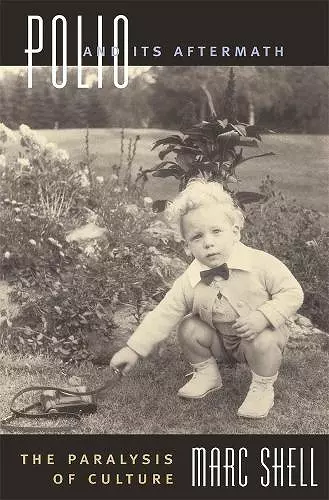Polio and Its Aftermath
The Paralysis of Culture
Format:Hardback
Publisher:Harvard University Press
Published:15th Jul '05
Should be back in stock very soon

It was not long ago that scientists proclaimed victory over polio, the dread disease of the 1950s. More recently polio resurfaced, not conquered at all, spreading across the countries of Africa. As we once again face the specter of this disease, along with other killers like AIDS and SARS, this powerful book reminds us of the personal cost, the cultural implications, and the historical significance of one of modern humanity's deadliest biological enemies. In Polio and Its Aftermath Marc Shell, himself a victim of polio, offers an inspired analysis of the disease. Part memoir, part cultural criticism and history, part meditation on the meaning of disease, Shell's work combines the understanding of a medical researcher with the sensitivity of a literary critic. He deftly draws a detailed yet broad picture of the lived experience of a crippling disease as it makes it way into every facet of human existence.
Polio and Its Aftermath conveys the widespread panic that struck as the disease swept the world in the mid-fifties. It captures an atmosphere in which polio vied with the Cold War as the greatest cause of unrest in North America--and in which a strange and often debilitating uncertainty was one of the disease's salient but least treatable symptoms. Polio particularly afflicted the young, and Shell explores what this meant to families and communities. And he reveals why, in spite of the worldwide relief that greeted Jonas Salk's vaccine as a miracle of modern science, we have much more to fear from polio now than we know.
Marc Shell's Polio and Its Aftermath is something of a hybrid. It is part memoir, part literary, film, and cultural criticism, part cultural history, and part meditation on the meaning of disease, especially the cultural meaning of polio. There is nothing quite like this book in the extant literature on polio. Nothing with the sweep and range of Shell's book has been previously published. -- Daniel J. Wilson, author of Living with Polio: The Epidemic and Its Survivors
Polio and Its Aftermath is distinctly original. There is nothing like it in the current literature. Shell's writing is at times witty and irreverent, but always outstanding. He uses some fabulous literary techniques that capture the reader's interest and imagination. Polio and Its Aftermath is truly outstanding. -- Julie K. Silver, author of Post-Polio Syndrome: A Guide for Polio Survivors and Their Families
Shell mines the so-called polio school of literature to illuminate a world of suffering and survival, and presents a lengthy analysis of Alfred Hitchcock's 1954 masterpiece, Rear Window, in which Shell sees a nuanced representation of the myriad issues raised by the disease. More controversially, in Shell's opinion the euphoria following the triumph of the polio vaccine left society, and the medical establishment in particular, unprepared to deal with later widespread virus outbreaks, such as HIV. He writes passionately of polio in the present tense: not only does it stalk victims across the globe, but millions who survived past epidemics still suffer...Shell's conclusions are startling and worthy of attention. * Publishers Weekly *
Marc Shell...makes some important points, including that polio has not been 'conquered,' if only because millions of its victims are still alive, often suffering from post-polio syndrome. -- Andrew Jack * Financial Times *
Marc Shell analyzes what he calls the vast field of "polio literature," namely published and unpublished works of poetry and prose, fiction and nonfiction, children's and adult literature that addresses polio either overtly or implicitly...Interspersed with his discussion of these cultural artifacts and technical developments is his personal account of contracting polio in Canada at the age of six. Shell moves easily between his own painful recollections and a dazzling array of texts...This book will be useful to anyone interested in the history and psychology of epidemics, in childhood in the first half of the twentieth century, and/or in disability studies. -- Elise Lamire * American Historical Review *
This book will be useful to anyone interested in the history and psychology of epidemics, in childhood in the first half of the twentieth century, and/or in disability studies. -- Elise Lemire * American Historical Review *
- Nominated for J. Anthony Lukas Book Prize 2006
- Nominated for Mark Lynton History Prize 2006
ISBN: 9780674013155
Dimensions: unknown
Weight: unknown
336 pages